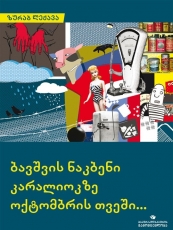A CHILD TAKES A BITE FROM A PERSIMMON IN THE MONTH OF OCTOBER
A Child Takes a Bite from a Persimmon in the Month of October is a collection of short stories and a short novel Buy our Souls – a naturalistic phantasmagoria, that won Literary Prize GALA in 2010. ‘If you are alone, if your fate is failure, if you happen to live somewhere where everybody is trying to escape, if you are surrounded by creatures just like you, and you still cannot find your own place among them, if the slightest change scares you, if you have surrendered to your past, to your present and, what’s more, to your future, then you are a happy man... you have a chance to see things that nobody has yet seen…’ These words are spoken by the protagonists but express the essence of almost all the characters created by Zurab Lezhava. Those words are attributed to a character sentenced for publicly raping a marble statue, a man who after leaving prison witnesses an extraordinary protest of statues; or the words may refer to a man who exchanges an old fridge for sex, or to a character who fearlessly faces danger in order to get Marilyn Monroe’s underwear to stop the Russian army’s invasion of Georgia. The novel Buy our Souls describes a new modern world, very similar to the real one, where facts are absurd, people are surreal, the regime is chaotic and a man steps into the dangerous freedom but has no soul to embrace it. How would one feel given the possibility of seeing the devil himself at any minute? If he were suddenly to approach out of nowhere, with all his horns and teeth? If he were to show himself in every other person passing by? And worse of all, if he considered himself your friend? One day in one of Tbilisi’s jail houses, prisoners receive a proposal to sell their souls: for a bag of tea, for a pack of cigarettes, for milk and coffee. But Victor Nazradze, just an ordinary man, asks for freedom. This unusual novel by Zurab Lezhava imbues an age-old plot with a very raw, naturalistic way of expression. Victor’s adventures, once out of prison, are filled with shocking images. He becomes a vagabond in the city of the Devil, where criminals and police are one and the same. Deciding he has nothing to lose, he settles upon a dangerous path to nowhere. Step by step he sees every legendary and unearthly creature. He marries a prostitute and discovers the ugly truth, washing his face in a magic spring at ‘Satan’s Ball.’ Accompanying the devil’s caravan, he even recognises the gates to hell: sewage tubes filled with excrement. Victor sees that the divine kingdom of Evil has no fairytale phantasmagoria. Instead, these supernatural matters are chaotically mixed into life’s troubles: poverty, filth, ugliness, criminality and solitude.
‘This is serious literature on serious themes, often extremely unserious and surprising in the decisions taken. It has a great deal of slang, contradictions: on one hand, it has cruelty, on the other, it has a naivety which overlaps with amazing knowledge. There is personal experience and boundless imagination. The impressions that pour out of through his narratives sometimes made me laugh out loud, sometimes, however, they astounded me with their daring and inventiveness.’
M. Kharbedia, literary critic / Radio Liberty
‘This book is a cocktail. It mixes the prose of Charles Bukowski (whisky), Woody Allen (cream), Paul Auster (liqueur). If you add a bit of Venedikt Yerofeyev (acetone), Sergei Dovlatov (grappa) and the late Daniil Kharms (lemon), then, as far as taste is concerned, this what you will get. As far as music is concerned, it’s hard to say: when you read this book you are not reminded of Tom Waits’s songs, but you will have the timbre of Waits’s voice. The band is made up of prisoners from a gaol and instead of musical instruments, they accompany the singing with iron bowls, plates, pots and ladles, while the clip is directed simultaneously by Kusturica and the old Jarmusch.’
Z. Burchuladze, author / magazine Tabula
EXTRACT
Translated into English by Elizabeth Heighway
LOVE IN A PRISON CELL
“Is that right?” a younger man called out.
“They don’t send just any old madmen to the Serbsky. You must be very special madmen!”
“Yes, we are indeed mad,” Pasha answered with false pride. “I, for example, have a bilateral brain fracture. And he has a mild case of mentalretardation.” He burst out laughing, quite cheerfully. Everyone smiled. Prisoners like cheerful people; they say that they don’t
have to put their hands in their pockets to pull out a word.
“Come on, boys, let’s have a drink—you’ve had a long journey,” said the old man to the newcomers. The old man was Vitsya Chetvertak. Chetvertak was a nickname meaning “quarter” because his first sentence was for twenty-five years. Since then he’d served several stretches and received terms of various lengths, but that first nickname had stayed with him. He loved two things: playing cards and tea. Yet while scholars, as everyone knows, often travel to villages to collect interesting proverbs, poems, and fairy tales, nobody had ever traveled to meet Chetvertak and write down what he said, more’s the pity... (See PDF)
EXTRACT
Translated into English by Victoria Field and Natalia Bukia Peters
SEX FOR FRIDGE
In case of using the information, please, indicate the source.
